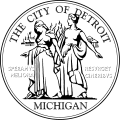Frederic M. Sibley
Frederic M. Sibley was born in Detroit in late October, 1883. [3] As an adult, he joined his father's lumber company and acted as treasurer until his father's death in 1912, after which he assumed the presidency of the firm. [3] In 1922, the Sibley Lumber Company employed 400 people and was the second largest lumber firm in Detroit. [3]
Sibley married Mabel Bessenger in August 1910. They had five children: Josephine, Frederic Jr., Dorothy, Suzanne, and Joy. [3]
Sibley is also known for his cooperation with August Fruehauf in developing the first semi-trailers to haul lumber. Sibley, approached August Fruehauf, his blacksmith about modifying a wagon to transport an 18' boat. Sibley wanted to use his Model-T roadster rather than a slow moving horse and wagon. August Fruehauf and his partner, Otto Neumann took several days to devise a solution. They removed the back seat of the Model-T to support the front end of the wagon and fashioned a 5th wheel coupling to attach the wagon to the back of the automobile. August called it a semi-trailer. Sibley was impressed with the solution and ordered additional semi-trailers for his lumber company. Henry Ford canceled the warrantee on the modified Model T's. August Fruehauf turned this invention into a goldmine. [4] The Fruehauf Corporation manufactured these trailers for many years afterward. [5]
This page is based on this
Wikipedia article Text is available under the
CC BY-SA 4.0 license; additional terms may apply.
Images, videos and audio are available under their respective licenses.



